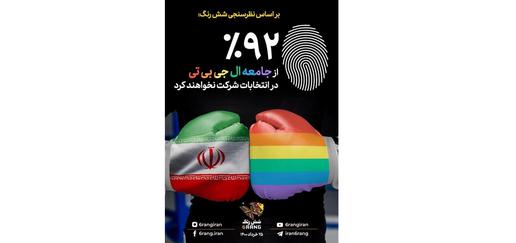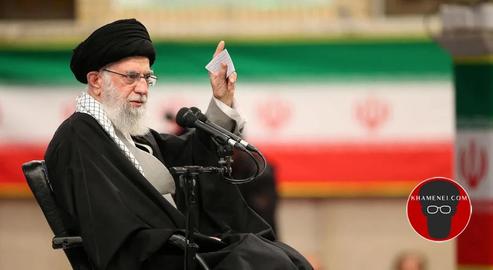The latest polls in Iran indicate that about 40 percent of the population intend to vote in today’s presidential election. A survey conducted among the LGBT community suggests even less of an appetite for the election.
The poll, which was carried out by the Sheshrang (Six Colors) Organization, suggests that only 3.7 percent of the community will vote; 4.4 percent have not yet decided whether to take part. Ninety-seven percent of LGBTQI people living outside of Iran who took part in the poll and who were eligible to vote said they would not take part.
The study was conducted between June 4 and June 15, 2021, and surveyed a total of 624 people from the Iranian LGBT community. Out of the 624 polled, 516 people were 18 years old and older and so eligible to vote; 409 of those polled currently live in Iran and 107 outside the country; 474 of those polled stated that they will definitely not vote.
The main reasons the participants gave for not voting included belief that boycotting the election was a protest against the Islamic Republic, an assumption that voting would not change the situation, a belief that the election was rigged and that the outcome had already been determined, and the conviction that the rights of women and LGBT individuals were entirely ignored — if not violated — by the Iranian regime.
Some of those polled stated that the candidates were not reliable, responsible or reputable. Others said it didn’t matter who the president was, it has no bearing on culture, the economy, on people’s rights and freedoms, or on the difficult living conditions many Iranians endured. They said no Iranian president would de-criminalize the LGBT community. Many people polled said they simply did not believe in Iran’s political system.
In many parts of the world, governments and cultures are taking steps to understand and accept their LGBT communities, and to uphold their rights. But this is not the case in Iran, which continues to violate their rights. In addition to the traditional, religious and often fanatical views rooted in Iran’s culture and society in general, Iranian law has made living conditions for the LGBT community almost unbearable. They have been castigated, labelled as “sick,” and been criminalized on the basis of their sexual orientation or gender identity. They face possible arrest, torture and even execution.
No Hopes (But Some Dreams) for Human Rights in Iran
Some of the individuals who took part in the survey and said they intended to vote also confirmed which candidate they were backing. Fifteen people said they planned to vote for Ebrahim Raisi, who is widely anticipated to win the election. Three people said they would be voting for Abdolnasser Hemmati, two for Mohsen Rezaei, and one for Saeed Jalili.
The survey polled people from 85 cities in Iran. Forty-six percent of those polled belonged to minority ethnic groups (Turks, Kurds, Arabs, Lors, Baluchis and others) and about 14 percent belonged to a religious minority. When asked whether they believed human rights could ever be realized in the Islamic Republic, 81 percent answered no, 3.5 percent said yes, 7.5 percent replied “to some extent,” and 8 percent said they did not know.
A similarly negative response was given to the specific question of LGBT rights, with a high proportion of survey participants saying it was impossible that such rights would ever be upheld in the Islamic Republic.
Participants were also asked to choose their preferred options for political change in Iran. More than 79 percent of them said they would opt for fundamental political changes that would mean the end of the Islamic Republic, and the majority of them said they supported "the overthrow of the Islamic Republic by the people.” The option of "regime change through the intervention of foreign governments” was also popular.
Only 21 percent of people surveyed said they believed political change within the framework of the Islamic Republic was desirable. Among those who did support this option for change, there was an appetite for reforming or rewriting the constitution and “the dissolution of the Velayat-e Faqih,” the republic’s system of governance. Others said a change of leader, meaning the Supreme Leader, would be effective in changing Iran’s political landscape.
"The results of this poll, while showing the deep gap between the view of a part of the society that has been systematically marginalized when it comes to elections, politics and the Islamic Republic as a whole, are very promising for the LGBT community in Iran,” said Shadi Amin, the director of Sheshrang. “For a long time, this society, due to widespread pressures, did not become involved in issues such as elections or other political issues, and was more occupied in self-knowledge and striving for social acceptance. Today, this level of self-confidence, despite the persistence of repression and discrimination, reflects this community's understanding of how to solve its problems. The plan to demand fundamental changes in the country's political system sends a clear message, and it seems that we will face a new and more thoughtful generation of activists in this field."
Many who took part in the survey did say they had dreams for Iran's future, and, despite their negative responses, they could see an Iran where taboos could be lifted, and where people were afforded freedoms backed up by laws. They said they imagined a future where Pride marches could take place, and where Iran could be part of an international LGBT community that honored friendship and unity with all nations and took care of people’s needs. They said they could envisage an Iran where everyone — regardless of their gender, sexual orientation, religion or ethnic group — enjoyed basic human rights. More than anything, they said they just wanted a normal life and the right to choose who to love, live with, and marry.
These are big dreams. For now, however, the LGBT community is working hard to ensure there is accurate and up to date information about LGBT people so that their lives and aspirations can be improved, however gradually.
Related Coverage:
An Iranian Gay Man’s Tales of Ridicule and Humiliation
Political Prisoners Boycotting the Presidential Election
Has the Regime Decided Low Election Turnout is its New Strategy?

























comments